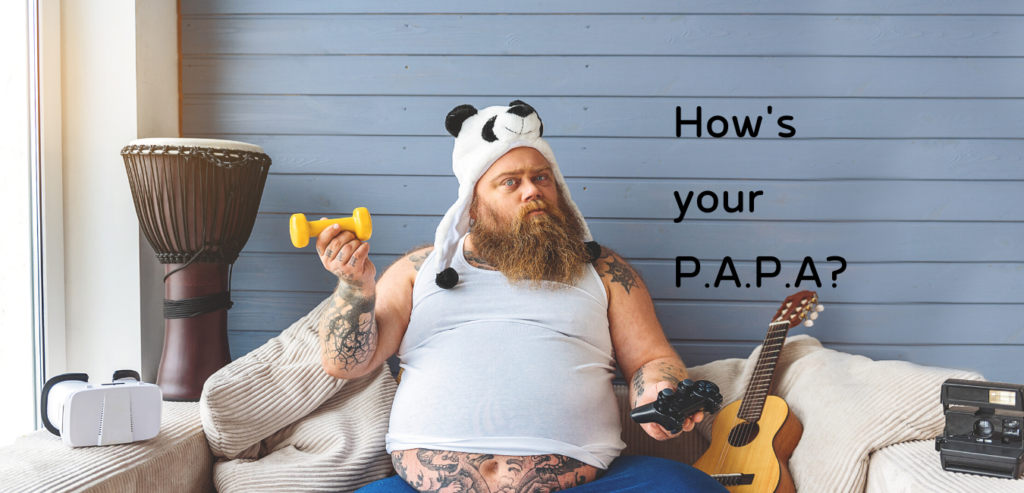‘I’m not lazier than my fit friends’ I tell myself, peering over a double chin at the crumbs on my bloated gut.
I made a commitment to start swimming three days a week- Mondays, Wednesdays and Fridays. Only it’s 10pm. It’s Friday. And I made that commitment a week ago.
‘Get up.’
‘Get going.’
‘Get at it.’
A noble Jiminy Cricket keeps telling me.
Doesn’t work.
Well, it hasn’t worked for me. Terry managed. We made the commitment together, only he’s swum Monday, Wednesday and… my smartphone vibrates under a swamp of sofa cushions. It’s a message from Terry.
’30 lengths :)’
He’s a smug fish.
Smug, but is he right to be? Does he really have more motivation, more self-discipline? Is he really (dare I think it for the risk of choking on my thoughts) more virtuous?
No.
I’m the one who suggested that we start exercising. I’m the one whose brother just had a heart attack. I’ve seen what that’s done to my sister-in-law, Julia, and their kids. Let alone Mum and Dad. Terry and I are both motivated by our sad reflection in the mirror but I’m also motivated by the vivid memory of my brother, Andrew, laying in a hospital bed- also my reflection, but in a crystal ball. Friends and family insist that if I don’t change my lifestyle, than I too, am staring down the barrel of a shotgun. As far as I can tell, Terry isn’t going through a family crisis. He’s not suffering those thoughts. He has no warnings to heed.
I’m more motivated than Terry.
And yet, he’s going to the pool. I’m not. Why?
Terry and I are the same age and in the same physical condition. We both know how to swim. My physical ability is not restraining me. At least, not any more than it is Terry. Neither my motivation nor my body is holding me back. The mysterious forces keeping me away from the pool, therefore, are not internal but external. They exist in the ether, somewhere between the sofa and the changing room.
When I take a step back, observe my situation and then compare it with Terry’s, it doesn’t take a fine-toothed comb to unveil some glaring circumstantial differences:
Like differences in proximity. Terry lives nearer his local pool- just over a mile, in fact. Mine is five miles away. Not far, but further. On Monday, when I actually went for a swim, I was stuck in traffic for over thirty minutes.
Terry’s pool might be closer to home, but mine is much nicer. Yet does a fancy facility increase my participation? No, because the high standard of the pool attracted the British Water Polo League and now they use it for training and matches. This makes lane availability limited and unpredictable. I have to check the billboard to see when the pool is open to the public. Swim lanes were available on Wednesday and I would have gone, but Joanna was angry with me for not telling her sooner and suddenly abandoning her with the kids. So I stayed home. Terry’s pool, on the other hand, is open to the public all day, every day, eight days a week. Unlike me, he can swim whenever suits.
The price difference is also noteworthy. Terry paid a £30 monthly membership, whereas the superiority of my pool puts a premium on the entrance fee, with each and every admittance costing £6.00. There’s no cheaper monthly subscription. Every time I think about swimming I shudder at the thought of the £72-a-month it would cost me.
And lastly, stringent management makes my gym a little less accessible. When Terry goes for a swim, he just waltzes past reception. The staff at the Cheadle Sports Centre never checked his medical history. Whereas when I went into Lytham Baths, I had to fill out a tedious, time-consuming liability form. Apparently I’ll need to fill one in next time, too.
Call them excuses, but that won’t help. The fact of the matter is that this has nothing to do with swimming. Forget the actual exertion of my body. Forget about tiring my arms and legs, wet stroke after wet stroke. I could plan on spending an hour floating on the surface like a grazing manatee and it wouldn’t make any difference to my participation. Because before I can even dip my half-naked body into the pool, I need to sacrifice more time, energy, money, and the quality of the relationship with my wife, than Terry does.
And what do I need to make myself expend more time, money and energy on an activity? What do I need to choose the pool over getting a bollocking from Joanna?
Motivation.
And that is exactly what we tell fellow couch dwellers they lack. If only they had more motivation and more self-discipline, then they could live healthier, happier more virtuous lives.
Sometimes this is the case. Sometimes we lack motivation. But comparing my situation with Terry’s shows me that motivation isn’t the whole picture. If my motivation is stronger than Terry’s and yet I am the one not swimming, then motivation can only be part of the equation. It is not, as pop culture would have us believe, the magical fuel that is solely responsible for all human accomplishment. On the contrary, in the machine of life that manufactures our behaviour, motivation is just a small cog.
What are the other cogs?
The Irish playwright George Bernard Shaw once said that,
‘love toward the economics is the route of all virtue.’
That’s right, Shaw doesn’t say that motivation is behind our virtuous behaviour, but instead, it is the economics. Instead of looking for more motivation- or waiting for my brother to have another heart attack- could I change my behaviour by adjusting another behavioural cog?
What if, instead of berating myself for a lack of motivation, I used the motivation I did have efficiently, making adjustments to the economic forces of Proximity, Availability, Price, and Accessibility?
Instead of letting the shaming voices of friends and family echo in my conscience, could I start changing my behaviour by considering a simple mnemonic? Could I try, instead, paying a little more attention to my P.A.P.A?
Eureka… my motivation could dwindle and I’d still be virtuous. We are, after all, not creatures of motivation but of convenience.
If motivation is a fuel, then here are four easy steps to ensure you’re using it as efficiently as possible:
1) Keep the activities you love in close Proximity. Attendance data from multiple sports clubs and fitness studios show that there’s a limit to how far we’re willing to travel to exercise. I thought that I was motivated enough to travel to the swimming pool, but according to the ‘Encyclopaedia of International Sport Studies’, 90 per cent of users of urban pools travel from within just three miles of the pool. It’s not that I have less motivation than regular swimmers. It’s that I had a one in ten chance of breaking the mould. From now on I’m going to acknowledge my limitations, respect my range, and ensure that where I exercise is within a distance that I, and everybody else, would routinely travel.
2) Choose activities that are Available when you are. (if they’re not, search for consistency). According to the book ‘The Economics of Sport and Recreation’, when people are asked why they don’t participate in sport the single biggest response is ‘I don’t have the time’. On Wednesday, I didn’t have the time because Joanna left me with the kids. But if I’d known in advance when the pool was available, I would have given my wife a fair notice. She would have been more understanding and it would have been easier for her (and I) to set that time aside. If I swam consistently- at the same time every week- there’d be little argument. By scheduling consistent exercise, life’s other obligations are less likely to interfere. Sure, if I had a pool in my living room available to me 24/7, then I could swim eratically, at any spare moment of the day. But I don’t. So next time my local facility or fitness class aren’t available on the same day, same time, week in week out, I’ll either suggest that they offer more consistency or I’ll be forced to find a coach, class or facility that does.
3) Keep the Price low (but not too low). The economic ‘law of demand’ states that: people consume less of a good or service when its price increases. My pool is more expensive than Terry’s. It wasn’t less motivation; just simple economics helping him get his feet wet. Had he paid an annual membership, it would have been cheaper still. However, instead of seeing him swim more often, a one-time annual fee could have hampered his participation. A study of 8,000 gym members titled “Paying to Not Go to the Gym” found that ‘new customers who chose a monthly contract were 17 percent more likely to stay enrolled than members who signed up for the entire year’. From now on, whenever charged, I’m paying for exercise monthly.
4) Improve Accessibility; avoid the obstacles. Obstacles are any other hindrances that force me to expend more time, energy and effort before I can even start exercising. Obstacles are often physical- like the limited parking outside of the yoga studio, or the inadequate public transport to the local dojo. But obstacles might also be mental- like a confusing gym website that makes signing up to a HIIT class a mental labyrinth or, as in my case, a tedious accident liability form that racks my brain before I can plunge into the pool. Only easy access makes for regular practice. It’s clear that either I avoid the obstacles; figure out a way to remove the obstacles; or else I am doomed to stay right here, sat on the sofa.
On Monday evening after work, whilst my brother Andrew lay in a hospital bed, I actually went to the pool. I sat in traffic for thirty-five minutes. I waited another twenty for the polo team to clear out. I clenched my jaw, handed over six bloody quid and then carefully read each question on that tedious liability form.
– ‘Any history of heart disease in the family?’ So glad you ask…
Is there any wonder I only did that once?
On Tuesday Andrew left the hospital and those depressing, vivid images of him peeing into a urine pot began to fade. By the time Wednesday evening arrived, I was still motivated. Just not motivated enough to overcome what are now some glaringly obvious economic restraints.
Call me lazy or accept that swimming was a bad economic choice. I don’t care.
Either way, at the start of this coming New Year, I’m not going to rely on a resolute surge of motivation. I know that it fades by January’s end.
Instead, I’m going to start by making participation in my next healthy hobby a little easier; use my motivation a little more efficiently. I’m going to take heed from a 19th century Irish playwright, give the economics a little more consideration and show my P.A.P.A a little more love.





